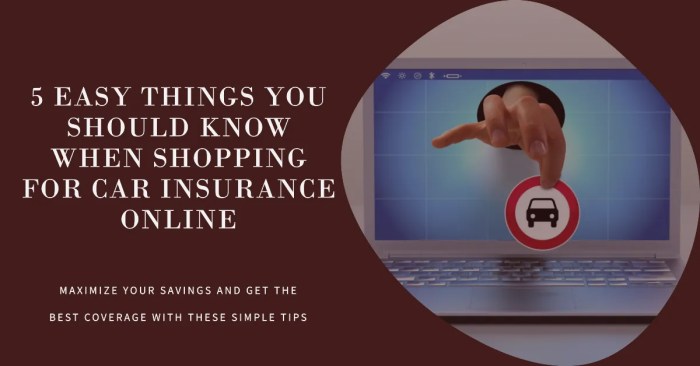Online buy car insurance is rapidly becoming the preferred method for securing coverage. This method offers convenience and often competitive rates, but it’s crucial to understand the process and potential pitfalls. This guide will walk you through the steps, highlighting key factors to consider when comparing quotes and policies online.
Navigating the online landscape for car insurance can be daunting, but with a clear understanding of the process, you can easily find the right policy for your needs. Factors such as your driving history, vehicle type, and desired coverage levels will influence the cost and selection of insurance.
Finding the right car insurance online can be a breeze, but it’s also crucial to understand the process and potential pitfalls. This guide breaks down everything you need to know about buying car insurance online, from comparing quotes to understanding policy details.
Understanding the Online Car Insurance Process
Purchasing car insurance online is becoming increasingly popular, offering convenience and often competitive pricing. The process typically involves these key steps:
1. Gathering Information
Before you start comparing quotes, gather essential information about your vehicle, driving history, and personal details. This includes:
- Vehicle Year, Make, and Model
- Vehicle Identification Number (VIN)
- Your Driving History (Accidents, Tickets, etc.)
- Coverage Preferences (Liability, Collision, Comprehensive)
- Your Personal Details (Name, Address, Date of Birth)
2. Comparing Quotes Online
Numerous online comparison websites allow you to compare quotes from various insurers. Use these tools to find the best coverage at the best price. Look for sites that allow for specific filter options (like discounts or specific coverage types). Be sure to compare policies that meet your needs.
3. Reviewing Policy Details
Once you’ve selected a policy, carefully review all the details, including:

Source: buyanyinsurance.ae
- Policy Limits
- Exclusions
- Deductibles
- Coverage Types (Liability, Collision, Comprehensive)
- Discounts (If Applicable)
- Premiums and Payment Options
Key Factors to Consider When Choosing a Policy
Choosing the right car insurance policy involves careful consideration of various factors. These include:
Coverage Options
Different coverage options cater to varying needs and risk profiles. Understanding these options is vital:
- Liability Coverage: Protects you if you cause an accident and are legally responsible.
- Collision Coverage: Pays for damages to your vehicle if involved in an accident, regardless of who is at fault.
- Comprehensive Coverage: Covers damage to your vehicle from non-collision incidents (e.g., theft, vandalism, weather events).
Discounts and Savings, Online buy car insurance
Many insurers offer discounts for safe drivers, good students, and other factors. Investigate these options to potentially lower your premium.
Customer Reviews and Ratings
Reading reviews from other policyholders can provide valuable insights into an insurer’s customer service and claims handling. Look for reputable rating agencies and consider their findings.
Common Myths and Misconceptions About Online Car Insurance: Online Buy Car Insurance
Several myths surround online car insurance. It’s crucial to understand the truth to avoid making mistakes.
Myth: Online Policies Aren’t as Reliable as Traditional Policies
Fact: Reputable online insurers use the same underwriting principles as traditional insurers. Policies are legally binding and offer the same protections.
Frequently Asked Questions (FAQs)
- Q: Is online car insurance more expensive than traditional insurance?
A: Not necessarily. Online insurers often offer competitive pricing due to lower overhead costs, but this can vary depending on the provider and your specific needs.
- Q: Can I compare prices from different insurance companies on one website?
A: Yes, many comparison websites allow you to compare quotes from multiple insurers simultaneously, saving you time and effort.
- Q: How do I know if an online insurer is legitimate?
A: Look for reputable companies with licenses and certifications. Check for customer reviews and ratings before making a decision.
Conclusion and Call to Action
Buying car insurance online is a convenient and potentially cost-effective option. By understanding the process, comparing quotes, and reviewing policy details, you can secure the right coverage for your needs. Don’t hesitate to contact an insurance agent if you have further questions. Compare quotes today to find the best car insurance deal for you!
Disclaimer: This article is for informational purposes only and does not constitute financial advice. Consult with a financial advisor or insurance professional for personalized guidance.
Sources:
Call to Action: Get Your Free Car Insurance Quote Today!
In conclusion, purchasing car insurance online is a convenient and often cost-effective option. By carefully comparing quotes, understanding the various policy options, and considering your specific needs, you can secure comprehensive coverage tailored to your circumstances. Remember to thoroughly review the terms and conditions of any policy before making a commitment.
Questions and Answers
What are the common online insurance scams to watch out for?
Be wary of websites offering unusually low rates or requiring excessive personal information upfront. Always check the website’s security and reputation before entering sensitive data. Compare quotes from multiple reputable providers to avoid falling victim to fraudulent schemes.

Source: macsopinion.com
How do I compare online car insurance quotes effectively?
Utilize comparison websites to gather quotes from various insurers. Pay close attention to the details of each policy, including coverage limits, deductibles, and exclusions. Compare not just the price but also the comprehensive coverage offered.
Can I use my existing documents to buy car insurance online?
Most online providers accept digital copies of documents like driver’s licenses and vehicle registration. Ensure the quality of these documents is sufficient for verification purposes.
